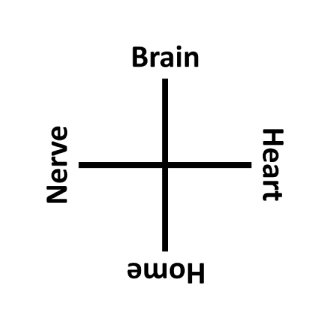 If the Wizard is a Wizard who will serve.
If the Wizard is a Wizard who will serve.
Then I’m sure to get a brain; a heart; a home; the nerve!
From the film The Wizard of Oz
Links:
http://en.wikipedia.org/wiki/If_I_Only_Had_a_Brain
[*8.124]
<>
 If the Wizard is a Wizard who will serve.
If the Wizard is a Wizard who will serve.
Then I’m sure to get a brain; a heart; a home; the nerve!
From the film The Wizard of Oz
Links:
http://en.wikipedia.org/wiki/If_I_Only_Had_a_Brain
[*8.124]
<>
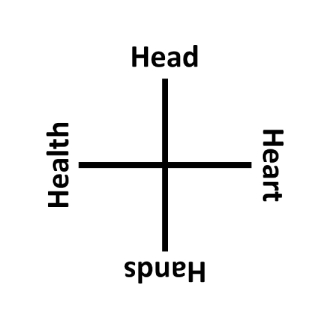 I pledge my head to clearer thinking,
I pledge my head to clearer thinking,
My heart to greater loyalty,
My hands to larger service,
and my health to better living,
for my club, my community, my country, and my world.
— From the 4-H Pledge
Links:
http://en.wikipedia.org/wiki/4-H
Further reading:
Also see Metropolis: “The Mediator between the head and hands must be the heart!”
[*7.14, *7.22]
<>
Fire, Aire, Earth, Water, all the Opposites
That strove in Chaos, powrefull Love unites;
And from their Discord drew this Harmonie,
Which smiles in Nature.
– From Sandy’s translation of Ovid’s Metamorphoses (1632)
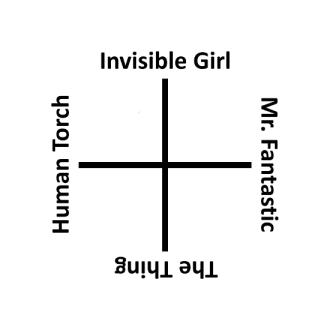 All fours are fantastic, but especially this superhero team! I hear that a reboot of the movie franchise is on the way.
All fours are fantastic, but especially this superhero team! I hear that a reboot of the movie franchise is on the way.
N ote they are close to being elementals, after the Four Elements. Paracelsus associated different spirits with each element.
ote they are close to being elementals, after the Four Elements. Paracelsus associated different spirits with each element.
Gnome: spirit of earth (industrious)
Undine: spirit of water (inspired)
Sylph: spirit of air (curious)
Salamander: spirit of fire (changeable)
Notes:
Her name is now the Invisible Woman, instead of the Invisible Girl.
Links:
http://en.wikipedia.org/wiki/Fantastic_Four
http://en.wikipedia.org/wiki/Elemental
http://en.wikipedia.org/wiki/Classical_elements_in_popular_culture
http://ovid.lib.virginia.edu/sandys/contents.htm
[*7.12, *8.96]
<>
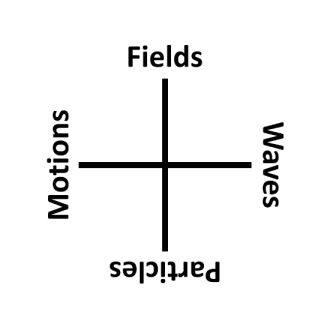 Is the fundamental nature of light and matter more like a wave or is it more like a particle? After hundreds of years of scientific research the answer is … Yes! Light and matter have aspects of both: sometimes one and sometimes the other. Kind of like that duck-rabbit illusion where the drawing flips back and forth between a duck or a rabbit.
Is the fundamental nature of light and matter more like a wave or is it more like a particle? After hundreds of years of scientific research the answer is … Yes! Light and matter have aspects of both: sometimes one and sometimes the other. Kind of like that duck-rabbit illusion where the drawing flips back and forth between a duck or a rabbit.
Now that we have the irreconcilable duality of wave and particle, can we add to the confusion and enlarge it into a four-fold? Two additional aspects (from physics) come to mind: motions, as in the motions of particles, and fields, as in electric and magnetic fields.
We immediately can see this four-fold as a play of dimensions: (idealized) particles have 0 dimensions, motions have 1 (along a path), waves have 2 (or more), fields have 3 (or more).
 We can also see this four-fold in a weak analogy with the Four Elements: particles for earth, waves for water, motions for fire, and fields for air (or space). Also compare to the four-fold for Lucretius!
We can also see this four-fold in a weak analogy with the Four Elements: particles for earth, waves for water, motions for fire, and fields for air (or space). Also compare to the four-fold for Lucretius!
Should fields above be replaced with wave-functions? I guess a wave-function is a kind of field of probabilities of existence over space and time, so perhaps it makes no difference!
Links:
http://en.wikipedia.org/wiki/Wave%E2%80%93particle_duality
http://en.wikipedia.org/wiki/Field_%28physics%29
http://en.wikipedia.org/wiki/Rabbit%E2%80%93duck_illusion
http://dl.acm.org/citation.cfm?id=2811288&picked=formats
Charis Anastopoulos / Particle or Wave: The Evolution of the Concept of Matter in Modern Physics
Notes:
I like Forces or Speeds better than Motions. Atoms better than Particles at top?
[*7.152, *8.32]
<>
What kind of reasons do we give for things happening? In physics, we call the reasons causes and the things that happen are called effects. One way that these causes can be divided into two is by distinguishing between chances and necessities: causes that can happen and those that must happen. In contrast, in describing reasons why we as agents do things, we merely call the reasons reasons, or reasons for actions. One way these reasons can be divided into two is by distinguishing between choices and plans: the reasons for making a choice and the explanations for planning a goal.
If we cannot understand the reasons that something happened, we might claim that it was just random or it was just fate. We might come to believe that there is an agent we know that is responsible for the thing happening by either a choice they have made or a goal they have planned. Or we might even think that there is an agent or institution hidden from our knowledge that might be responsible, with hidden choices and plans. This is not the same as the world operating by chance and necessity.
If we cannot understand the reasons why an agent does what they do, their behavior appears random or even insane. If we can understand the reasons for their actions, their behavior may be justified to us, but it can still be considered good or bad. Of course, our good actions may be ineffectual against the world’s chances and necessities, in which case we are not responsible for outcomes. Even so, our bad actions and our plans and goals may still be scrutinized in a normative way. If an agent’s actions or plans appear to be contrary to our goals or society’s goals, that agent is at odds with us or society.
Ordinarily what is called free will consists of the freedom to make choices and plans and to attempt to carry them out. What is free will free from? Is it free from physical laws, or the energy and matter of our brains and bodies? That doesn’t make much sense to me. Is it the same as chance? That isn’t a freedom worth wanting, as Daniel Dennett says. If we do something that doesn’t make sense to us, various experiments have determined that we then construct reasons for ourselves that we can understand and believe that explain our actions. Are they the real reasons or have we just lied to ourselves?
Regardless whether free will exists, the explanations given by choices and plans are required for our understanding of each other’s actions and goals. 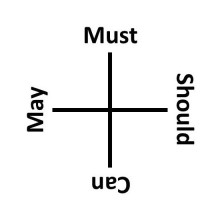 However, these must not be confused with the chances and necessities of the world when and where they apply.
However, these must not be confused with the chances and necessities of the world when and where they apply.
Notes:
This four-fold consisting of Choice, Chance, Fate, and Plan is inspired by the Modal Verbs: May, Can, Must, and Should. One might consider it as the double duality of internal or external and possibility or necessity.
Also consider changing “chance” to “luck”, and “choice” to “pick”.
Links:
http://en.wikipedia.org/wiki/Causality_(physics)
http://people.wku.edu/jan.garrett/302/4persona.htm
[*8.116]
<>
Always Forward Between Heaven and Earth
Psychological Musings
Critiquing anime and everything else
an evolving guide to practical Stoicism for the 21st century
Category Theory, Haskell, Concurrency, C++
Reviewing fascinating science books since 2017
Every Fourth Thing
Derek Wise's blog: Mathematics, Physics, Computing and other fun stuff.
integrating 4 binary opposites in life, learning, art, science and architecture
integrating 4 binary opposites in life, learning, art, science and architecture
Chasing the Paper Rabbit
experiments in a reaction from the left
A blog about computers, evolution, complexity, cells, intelligence, brains, and minds.
mind maps, infographics, and expositions
neat ideas from unusual places
Introduction to a Quadralectic Epistomology
Astronomy, space and space travel for the non scientist
Every Fourth Thing
Art by Marcy Erb
A Serious Look at Trivial Things
A Survey of Tetradic Testimonials in Architecture
Musings from a Naturalist
Why Evolution is True is a blog written by Jerry Coyne, centered on evolution and biology but also dealing with diverse topics like politics, culture, and cats.
Four-fold thinking4you
Craig Weinberg's Cosmology of Sense
Purveyors of Fine Anime Reviews and Ratings Since 2010
Between Subject and Object
Every Fourth Thing
Every Fourth Thing
Every Fourth Thing
Every Fourth Thing
Every Fourth Thing
Sometimes those Sticking their Heads in the Sand are Looking for Something Deep
Online Home of Christopher Vitale, Associate Professor of Media Studies, The Graduate Program in Media Studies, Pratt Institute, Brooklyn, NY.
RESEARCHING THE DEMANDS OF THOUGHT
Explorations in the Paradoxes of Meaning
"The centaur of classical metaphysics shall be mated with the cheetah of actor-network theory."
objects & things, design, art & technology